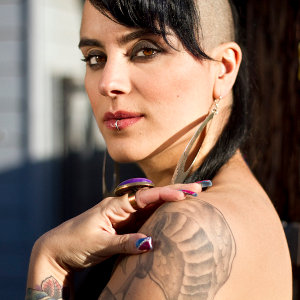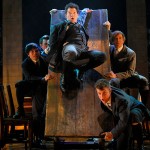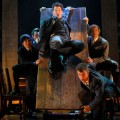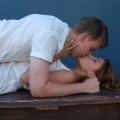Her choreography is fearless, provocative and unique, as is her personal sense of style. The fiery choreographer from FOX’s So You Think You Can Dance spent the past month in San Jose working on San Jose Rep’s new production of Spring Awakening, the edgy musical by Steven Sater and Duncan Sheik that won 8 Tony Awards including Best Musical.
In an in-depth interview, Sonya Tayeh talks about discovering her love of dance, her influences and motivators, how she got onto the hottest dance show on television, why she can’t go for weeks without teaching, how the San Jose Rep’s project developed and her personal connection to Spring Awakening‘s themes of sexuality and self-discovery.
How did you figure out that choreography was something that you wanted to do?
I got a little bit of a late start but I always felt like I was a dancer. When I was younger, I didn’t have any technical training until I was 18. But throughout my childhood, I always liked making dances. I was always shy as well, and as I got older I knew I wasn’t going to enjoy me performing on stage and getting that type of attention.
When I went to college and started training as a dancer, I immediately knew that I wanted to choreograph. When I took my first choreography class, I knew that’s what I wanted to do and I became wonderfully obsessed with it, creating dances for everyone and taking choreography workshops and just experimenting with choreography. But I also knew I wanted to really tap into my own voice and the way I wanted to move. In the midst of my training I made sure—and my professors always stressed this—to know the history of dance and to study the forms so you can excel in what you’re doing and be smart about it, but in the same breath create your own voice and your own genre of movement, your own signature.
Were there any teachers that had a big impact on you when you first started getting into dance?
Yes. When I first went to a studio, it wasn’t the best training. I didn’t feel supported at the time. It was a studio where all the dancers had trained since they were little, and I walk in and they see me saying “I want to be dancer.”
At a community college, Diane Mancinelli, an amazing professor, really believed in me and said, “It’s gonna take conviction and discipline, and I know you can do it.” So I studied my ass off. I figured out I had fallen in love with it and I did everything I could to get really good really fast. I danced from 8 in the morning to 11 at night, every single day, literally, for five years. Then I got my dance degree and started my career.
I definitely think about what I would be if I had that training growing up, but my path is my path. Everybody has their own path. I just believe that with conviction and discipline you can make anything happen.
I know there’s this stigma attached to it, that you should be training from a young age, but it’s not always that case. I keep hearing, “You’re too old,” or, “You’re too late,” but I just don’t agree with that at all. I had no flexibility, no technique, I wasn’t a natural mover. I was patient with myself, I knew it was going to take time. I took beginner ballet classes with 6-year-olds with a smile on my face because I knew it was something I wanted to do and it was something I wanted to respect. I never thought I could just come into it and be amazing. I was very understanding of my path and not viewing it as a limitation.
I’ve met a few others with a similar story. For some reason, it’s more accepting for men to start later in dance, which I think is ridiculous. It’s all given me more motivation to learn and to be really good at it.
How did you get involved with FOX’s So You Think You Can Dance?
I moved to Los Angeles in 2007 and got signed with McDonald Selznick Associates, an amazing agency for dancers and choreographers. I gave them a list of the dreams I wanted to pursue—I called it my “dream list”—and So You Think You Can Dance was the first dream on my list. They sent my reel over to the producers, got me a meeting, and they signed me up.
You’re known on the show for having some of the more interesting music in your routines. How do you choose a song?
I love music. I love electronic music, orchestral electronic music. It has to have a bass line. It has to be rough around the edges. It has to be heavy in its energy. It has to be aggressive. Even in my contemporary pieces, it has to have deep layers to it.
A lot of my music comes from my friends. This group called Steed Lord, I use a lot of their music and they’re great friends of mine. I like to find more independent groups, bands and electronic DJ’s. My choreography doesn’t read well with mainstream music, so I spend forever and ever looking for music. I work with District 78 a lot. They created a lot of music for me this year including the finale group piece and the duet with Melanie and Sasha.
Is there a routine of yours on the show that stands out as your favorite?
I don’t have a favorite. I love doing group pieces, I love using the space for that many people. The piece where I felt my movement was approached the exact way I wanted it to be was with Ellenore and Jakob a couple of seasons ago (video). That was something where I really felt that both of them tapped into that place with me. I love anything that I do with Allison Holker, an All-Star last year. Honestly, she’s just amazing. And Melanie and Sasha from this past season, that was one of my righteously greatest ones because of the two women. I love when women can dance like men.
You’re from Brooklyn via Detroit, now in Los Angeles. Do you plan to stay on the west coast?
Yeah, I love it here. I love living in Los Angeles. I have a really great group of friends, my boyfriend and my dog, it’s awesome. I’m not going anywhere for a while.
How did you get involved with San Jose Rep’s production of Spring Awakening?
Rick Lombardo, the director, called my agency and offered it to me. I immediately said yes because it’s my favorite musical. I saw it on Broadway and fell in love with it. Bill T. Jones is one of my all-time favorite choreographers. I thought it was an important musical all around; the look of it, the music, the story, everything.
Had you choreographed a musical before this?
The Last Goodbye at the Williamstown Theatre Festival was my first musical production. They’re doing some re-casting and revisions to the script to bring it back. [Adapted by Michael Kimmel, The Last Goodbye is an abridged version of Romeo and Juliet set to songs by Jeff Buckley. It premiered at the Williamstown Theatre Festival in 2010 and was met with rave reviews.]
How did you prepare for developing your own choreography for Spring Awakening?
The main thing when I talked with Rick is that it’s not a revision of the Broadway production. It’s our own show. That was important to me because I wanted us to have our own swing on it. There was no compare and contrast. That’s why I really liked working with Rick. We felt what it needed and we did it.
I came into the rehearsal and we started messing around with the music and talking about the intention of each scene and the intention of the story in its entirety and built it from there. It was very important to me that the movement was emotionally driven and not technically driven, because it’s a very emotional and heavy-handed show. I wanted to create that in the movement. The movement is the music and the music is the movement, it just bleeds into each other, it’s not jarring.
I had to come from a really honest place and that’s what I love about the show. It’s very sincere, it’s very real. It’s uncomfortable. Everything that humans feel growing up, feeling uncomfortable in our bodies, feeling not understood and not heard, judged and stunted. It’s so relatable and so important for both kids and parents to see. It’s universal for all of us.
Did a lot of it come together at once or did it develop organically?
It happened organically in pieces. It was awesome of Rick to have me focus on one section at a time so it wasn’t too overwhelming. I’m not used to following a story line and my assistants were key to helping make sure it made complete sense. We did a lot of talking and a lot of breaking down and overanalyzing, making sure the movement is portrayed in the right way with the music and the story and not just for movement’s sake.
I was terrified because I really love this musical. It’s so hard to be a kid, to be a teenager. It’s so hard to feel outside of your body, to feel not understood and not having parents who are open to explaining the ways of life to you in terms of puberty and sex and masturbation and love and lust. It’s so hard. I wanted to project that through the movement and not be afraid of how far it would go.
That’s the main point: I can’t be restricted because the piece is about being restricted. I wanted to show the strain of resistance. I wanted it to say, “Look, this is what you’re doing to me, this is what you’re teaching me, and it’s not enough. Look at what’s happening to my body.” There’s all these restricted, holding type postures, the tightening of the stomach, the clenching of the hands because you’ve never been touched before. I told the actors, “We’re not whispering this out, we’re screaming this out. We’re begging for our bodies and our minds, we’re being a woman and a man.”
I’m not a parent and I can’t imagine how hard it is to explain it, but I also know that this is a familiar issue that we all have dealt with, all of us, every generation. We need to be more vocal about these things and more understanding when it comes to adolescence. I might take all this back when I’m a parent, but as of now this is how I feel.
Some of the cast members were San Jose State University students. How did you relate with them in rehearsals?
I demanded honesty from the beginning. That’s very difficult but it’s the only way to do it, to talk about our conflicts and our own personal demons. We conversed a lot and sometimes spent half the day talking and then the movements would just come out. I broke every gesture down because I wanted them to be able to articulate it when I’m gone. It was so great and I just loved them. I told them some personal things about me.
Are there any aspects of your childhood that draw a personal relation for you to the themes in Spring Awakening?
I felt completely uncomfortable in my body as a teenager. It was scary for my mom to break it down to me about what was going on with myself. I wanted to be heard and to be able to express what I was feeling, but when you’re that young, you don’t know what to say. There’s always that feeling of not belonging in a place, not being comfortable with my sexuality, not understanding my body as a woman. Why is this happening to me? Why do I feel this way? Even now, it’s always a challenge to be accepted. I definitely know how that feels.
I have an amazing relationship with my mom. My father died when I was young. My mom was always open and honest with me and my two sisters. It’s hard, as you can imagine, I lose my father and then it’s just her raising three girls. It’s not the easiest thing.
It’s not always so traumatizing but it is when you don’t understand what’s happening to your body. When you’re getting turned on and attracted to a person, you’re completely uncomfortable and you don’t know how to articulate how you’re feeling. Or you come from a family who refuses to explain sex and love and puts these standards on you as a woman or a man. Everyone has felt that way.
Have you choreographed for film?
I am working on a feature film right now but I can’t talk about it. My new goal is more theatre and film. I’m really in love with theatre right now, I found a new love for it. I didn’t realize how much I would love it. If Broadway calls, I’ll be on the plane.
When you’re not choreographing, you also seem to spend a lot of time teaching.
I love teaching. It’s one of my favorite things to do. I love seeing the process and I enjoy being a part of the next generation who will hopefully be teaching my children. I think it’s my duty as a person of dance, as a dance maker, to educate and teach young dancers.
While you’ve been in town working on Spring Awakening, what’s been your favorite thing about San Jose?
I love how close everything is downtown. We’ve been eating really well. I haven’t been able to explore much because we’ve literally been working so hard. We go to rehearsal, we eat, and then we pass out. That’s been the whole month’s routine. It’s been a while since I’ve had a morning or night free.

 Stage Review: Spring Awakening
Stage Review: Spring Awakening 


